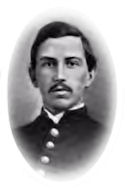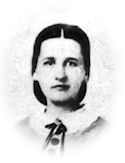Camp Maskell, Gauley Bridge, December 1, 1862.
Dearest Lu: — We are on the south side of the Kanawha — same side as the Eighty-ninth — at the ferry below and in sight of the falls, two miles below Gauley Bridge. There, do you know where we are? It is a muddy — bad slippery mud — place, and as it rains or sleets here all winter, that is a serious objection. Now you have the worst of it. In all other respects, it is a capital place. Beautiful scenery — don’t be alarmed, I won’t describe; no guard or picket duty, scarcely; good water and wood; convenient to navigation; no other folks near enough to bother, and many other advantages. The men are building cabins without tools or lumber (sawed lumber, I mean,) and will be at it some weeks yet before we look like living.
It was jolly enough to get back with the men — all healthy and contented, glad to be back in western Virginia by themselves. They greeted me most cordially. It was like getting home after a long absence. The officers all came in, twenty-four in number, and around the wine, etc., you saw packed, talked over the funny and sad things of the campaign — a few sad, many funny. We resolved to build a five-hundred-dollar monument to the killed, etc., to be put in cemetery ground at Cleveland.
A story or two. Bill Brown, as he rushed forward in the bayonet charge at South Mountain, said to his lieutenant behind him: “I’ll toss the graybacks over my head to you, and you must wring their necks.” In Washington a lady asked Bill if he wouldn’t have his handkerchief scented: “Yes, yes,” said he and tore off about four inches square of his shirt and handed it to her. She took the hint and gave him a fine handkerchief.
In Maryland, Colonel Scammon dressed up in a splinter-new unform. He met a fellow hauling into camp a load of rails to burn. Colonel Scammon said: “Where did you get those rails?” “On a fence down by the creek.” “Who authorized you to take them?” “I took them on my own hook.” “Well, sir,” said the colonel, “just haul them back and put them where you got them.” The fellow looked at the colonel from head to heel and drove ahead merely remarking: “A bran’ new colonel by G—d!” The doctor asked Bill Brown where he was wounded: “Oh, in the place where I’m always ailing.” . . .
Comly is urged by leading officers in this brigade to be made colonel of the Eighty-ninth. He would be a capital man for the place.
My mess are eating up the good things with a relish. It consists of Comly, Doctor Joe, McIlrath, and myself. We have Company A’s fine tenor singer for cook — a good cook and a nice gentleman he is. My orderly, Carrington, and Doctor’s ditto are the only servants, all soldiers — contrary to law, but much better than having darkies. Dr. Joe has built a bed today wide enough to have Webb and Birch both sleep with him! He really thinks of it.
Dr. Jim resigned today on a surgeon’s certificate. Joe thought it best and I concurred. He is not in danger, but was evidently breaking down in this climate. Old Gray is with his company. Dr. Joe saw him today carrying mud to a couple of men building a chimney, and asked him what he was doing now. Gray replied: “I am clark to these gentlemen!”
The Eighty-ninth were camped on this ground. When the Twenty-third moved up alongside of them, the officer of the day in the Eighty-ninth was heard by some of our men telling in his camp that they were near an old regiment now and they must be watchful at night or the Twenty-third would steal whatever they wanted! That night cook-stoves, blankets, a tent from over the sleepers’ heads, and a quantity of other property mysteriously disappeared from the Eighty-ninth notwithstanding their vigilance. Our men sympathized, our camp was searched, but, of course, nothing was found. After the Eighty-ninth moved, men were seen pulling out of the river stoves and other plunder by the quantity. The Eighty-ninth’s surgeon was a friend of Captain Canby. He called on the captain a few days ago and was surprised to find his cooking stove doing duty in Captain Canby’s tent. The best of it was the Eighty-ninth appeared to take it in good part.
Bottsford and Kennedy, both captains and A. A. G’s — Bottsford for General Scammon and Kennedy for General Crook. Hood came up with me from Gallipolis. . . .
Affectionately ever,
R.
Mrs. Hayes.











